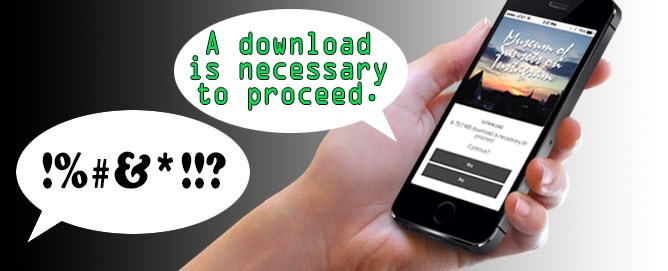 Ah, these are perilous times…navigating data usage plans, WiFi connections and downloadable content. It’s sometimes hard to remember what life was like for all of us before any of this was possible…but we digress…
Ah, these are perilous times…navigating data usage plans, WiFi connections and downloadable content. It’s sometimes hard to remember what life was like for all of us before any of this was possible…but we digress…
Has this ever happened to you or someone you love**? A tourist from France visits a museum in New York City. At the Information Desk, he sees there’s an app available for download and wants to access it. The app requires two downloads: the first is the shell of the app and the second is the bulk of the content. The app alerts him to the size of the second download, and he taps ‘yes’ to continue. Back home in Paris, he gets a 250 euro usage bill for the additional download. He is surprised and understandably upset. He feels misled by the museum.
So what are some best practices for museums to let visitors know about the potential costs involved with the ‘double download?’
• A museum can stock hardware like our Opus units to offer international visitors who don’t want to use their personal devices.
• Signage at Information Desks should clearly indicate that the app is available but that data usage rates may apply.
• Visitor Services and other associate museum staff must themselves understand how large the app is so they can guide the visitor accordingly.
• Strong WiFi hotspots are crucial to facilitate an easy download process.
**Please note, details have been adjusted to protect the innocent. Any resemblance to actual persons, living or dead, or actual events is purely coincidental.
Post script
Incidentally, this isn’t a new story, but it still happens. The debate continues about the convenience and efficiency of what Nancy Proctor, Deputy Director for Digital Experience at the Baltimore Museum of Art, calls the “double download.”
We think it has its advantages: When new content is available on the app, the user only has to download the new content (or updates), not the whole app. The minute you make any changes to the CMS, the app is immediately updated. And it seems infinitely better than streaming an app, which requires very reliable WiFi access and is prone to frequent short pauses while content loads on the fly.
As always, comments are welcome.







